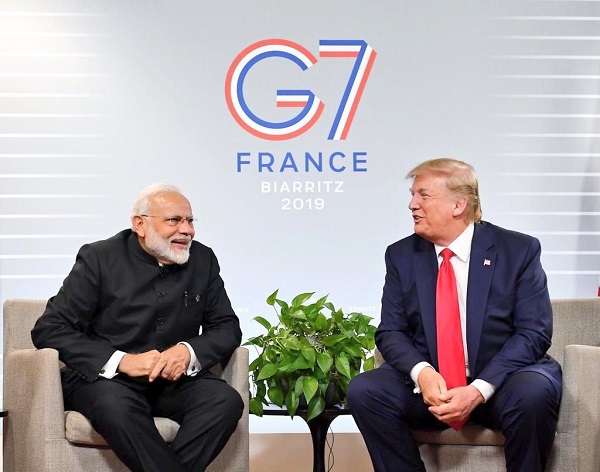
Biarritz (France), US President Donald Trump on Monday cleared the air about his controversial claim that Prime Minister Modi had asked for his mediation on Kashmir, saying that India and Pakistan could bilaterally do something “very good”.
A readout of their bilateral talks here on the sidelines of the G7 summit reinforced it, saying: “President Trump reaffirmed the need for dialogue between India and Pakistan to reduce tensions.” It is a tacit admission by Washington that the disputes between the neighbours are bilateral matters.
During the two leaders’ interaction with the media before their bilateral meeting, Trump said: “When they (India) speak with Pakistan, I’m sure they will be able to do something. They will be able to do something probably very good.”
When asked if his offer to mediate was still on the table, Trump said: “I’m here,” but added that Modi thinks India and Pakistan can do it on their own.
About the situation in Kashmir after India had withdrawn its special constitutional status, Trump said that Modi told him on Sunday night that it was “under control”.
Modi firmly reiterated that Kashmir was a bilateral issue, ruling out mediation by Trump or anyone else.
While speaking to the media, the US leader said: “We spoke last night about Kashmir, and Prime Minister Modi feels that he has it under control. And now when they speak with Pakistan I’m sure they will be able to do something. They will be able to do something probably very good.”
Modi said: “India and Pakistan have several bilateral issues. And after the election of Prime Minister Imran Khan, I told him that both our countries have to fight against poverty, illiteracy, backwardness and both should work for the betterment of our people.
“And I have conveyed this to President Trump as well, and we keep discussing our bilateral issues,” he added.
Their declarations on the sidelines of the G7 summit set at rest the confusion caused by Trump’s off-the-cuff claim that Modi had asked him to mediate on Kashmir when they last met in Osaka in June during the G20 meeting.
Trump had made the assertion when he and Pakistan Prime Minister Imran Khan were preparing to meet at the White House in July. It was immediately refuted by India, which pointed out that ever since the signing of the Simla Agreement between the leaders of the two countries in 1971, disputes with Pakistan are bilateral matters without room for third party intervention.
After his meeting with the Indian Prime Minister, Trump tweeted: “Just wrapped up a great meeting with my friend Prime Minister @NarendraModi of India at the #G7Summit in Biarritz, France!”
Modi in his tweet said the two countries would soon discuss trade issues – an irritant for Trump. He tweeted: “We had useful discussions on bilateral matters. We agreed to address trade issues for mutual benefit soon. Looking forward to expand cooperation as large democracies for the benefit of our citizens and global peace and prosperity.”
The readout of Trump-Modi meeting said: “The two leaders discussed ways to broaden their strategic partnership and greatly increase trade between the US and India” and that Trump “acknowledged India’s role as a critical partner in Afghanistan”.
Last week, Trump had said that India and other countries should take up the fight against terrorists in Afghanistan, lamenting that Washington was the “only one fighting against terrorism” in the war-torn nation.
The US is in the final stages of negotiations with the Taliban to reach a settlement that would enable it to withdraw its troops from there. India, however, is wary of such a deal.
Modi spoke in Hindi and an interpreter translated his remarks. Trump, who has an antagonistic relationship with the media, quipped: “He actually speaks great English, he just doesn’t want to talk to you.”
Modi laughed out loud and the two leaders clasped hands.
“It’s great to be here with Prime Minister Modi,” Trump said and added that they would discuss trade and the military at their bilateral meeting.
Trump said he “learned a lot about India” from Modi at dinner Sunday night and that it is a “fascinating place, it’s a beautiful place”.
Presumably, he learned about the nature of the Indian nation as a secular democracy with the world’s third-largest population of Muslims.
Trump had offered last week a simplistic stereotypical explanation of the Kashmir dispute, saying: “You have the Hindus, and you have the Muslims, and I wouldn’t say they get along so great. And that’s what you have right now.”
“And you have millions of people who want to be ruled by others, and maybe on both sides, and you have two countries that haven’t gotten along in a long time,” he added.
Ahead of the Modi-Trump meeting, a senior US official tried to lay the controversy around Trump’s claim of being asked to mediate to rest by stating categorically: “We just note that India has not requested any formal mediation.”
On bilateral issues, while Trump views India as a major strategic ally in dealing with China’s expansionist programme, he has raised the pitch on differences on trade with New Delhi.
In this context, the readout emphasised increasing trade between them.
Trump has accused India of charging high customs duty on several imports from the US, notably the Harley Davidson motorcycles beloved of a section of his base.
The US has also complained about restrictions India has placed on data storage by financial institutions and on operations of e-commerce companies.
Recently, the US withdrew the special treatment given to some imports from India under the General Scheme of Preferences programme.
India has complained about US enforcement of visa regulations against Indian professionals.







